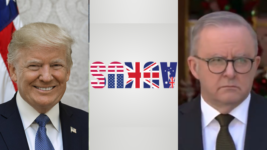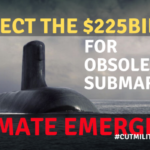In the Unlikely Event AUKUS Reaches Fruition, Australians Will Be Paying $35 Million a Day

Looking back to the September 2021 announcement of the AUKUS pact and its centrepiece Australia’s acquisition of eight nuclear-powered submarines (SSN), it’s fair to say that then PM Scott Morrison wasn’t too concerned about seeing the boats come to fruition, but rather the glory of the momentary spectacle was enough to satiate his megalomania in his final days in office.
But Morrison needn’t have had too much concern anyway, as his Labor counterpart current PM Anthony Albanese ploughed ahead with the plan with gusto, as he appeared in San Diego alongside doddering US president Joe Biden to launch the AUKUS optimal pathway on 14 May 2023.
The White House Briefing Note released to accompany the launch revealed the broader details of the AUKUS agreement Pillar I, which include the establishment of Submarine Rotational Force-West (SRF-West): a joint presence involving four US and one UK SSN being rotationally stationed at HMAS Stirling, off the coast of Boorloo-Perth in Western Australia.
SRF-West is expected to be operating from 2027 onwards. The presence of allied foreign nuclear-powered submarines in WA has always raised questions as to the necessity for our nation to acquire its own SSN, as the advantage the Australian-owned boats would provide in terms of the ability to sneak up on mainland China from a base located on this continent, will be covered by SRF-West.
A report released in August by the Congressional Research Service outlined that rather than ensure Australia acquires SSN via the US and the UK, it may be preferable for those powers to operate their own subs out of this country, and, as the entire viability of the AUKUS sub deal now appears in jeopardy, its overseer, the Australian Submarine Agency, has now been placed under review.
Dead in the water
The Independent and Peaceful Australia Network (IPAN) highlighted earlier this month that recent polling regarding AUKUS has found that 48 percent of Australians now want the government to review the $368 billion AUKUS defence and submarine agreement, after former US president Donald Trump was re-elected to the top office in November.
The network of local peace groups and advocates further highlights that a lot of Australians are not too keen on its $35 million daily price tag for the next 30 years, especially during the current cost-of-living and housing crisis that’s plaguing the nation.
AUKUS Pillar I relies on Australia acquiring three Virginia class SSN from the United States starting in the early 2030s. And these subs are yet to be built.
As IPAN spokesperson Justin Tutty outlined on 9 December, the US is first producing enough boats to satisfy its own needs, which is currently 17 boats short of the required 66 Virginia class SSN fleet, prior to any thought of covering the three Viriginia class SSN slated for this country.
Tutty further pointed out that the Biden administration has just asked “US Congress for AU$8.8 billion in emergency funding, so they can meet shortfalls with the US Virginia-class submarine program”.
The Congressional Research Service report outlined in August, that over the past two decades, the US was producing 2 subs a year, but this has dropped down to 1.2 to 1.4 since 2022.
So, in order to meet both nation’s needs under the current arrangements, the US has to raise production to 2.33 boats per year in the coming years, which was prior to Biden raising funding issues.
Indeed, the Pentagon’s 2025 financial year budget provides funding for just one Virginia SSN, while US Attack Submarine Program CEO Rear Admiral Jon Rucker revealed in November that despite the production rate being nowhere near capacity, he suggests the shortfall will be met in the future, while too revealing that US priority is actually focused on producing its new Columbia class SSNs.
Australian Greens Senator David Shoebridge told Sydney Criminal Lawyers in April that this country has committed AU$4.6 billion each to both the US and the UK submarine industries, and this funding is not to be expected back regardless as to whether any of the eight subs ever appear.
Third verse, same as the first
The 2021 AUKUS announcement also involved then PM Morrison dropping it on the French, via the actual unveiling of the eight AUKUS SSN deal, that Australia would no longer be honouring a $90 billion contract that would have seen France producing 12 Barracuda class conventionally-powered submarines, which was already underway after being established in 2016.
Retired Australian Navy submarine specialist Peter Briggs produced a report for ASPI (the Australian Strategic Policy Institute) in October 2018, which makes the case for this nation to transition to nuclear-powered submarines, but the former navy officer made clear that the acquisition of the French boats should go ahead, so that this country could build its submarine capacity and personnel.
In a new article for ASPI dated 5 December, Briggs is now suggesting that “Australia should start planning for acquisition of at least 12 submarines of the French Suffren design”, due to the fact that “the current AUKUS plan for eight nuclear-powered attack submarines has always been flawed, and now its risks are piling up”.
As for the AUKUS deal, Briggs states our nation should continue with the plans as are, but Australia should further be ready to pull out of the arrangement as soon as its clear it is no longer viable.
On the same date as Briggs’ new recommendations appeared in print, defence minister Richard Marles announced he’s appointed former defence secretary Dennis Richardson to assess the operations of the Australian Submarine Agency (ASA), which is charged with overseeing the controversial $368 billion AUKUS submarine deal.
This development came after the ABC reported on widespread dissatisfaction within the ASA in September, which saw its then deputy director-general for policy and program implementation, David Hallinan, quit.
And in the wake of the ASA review announcement, Tutty further stated that as far as IPAN is concerned, these developments all point to the Congressional thinktank’s suggestion that the US should drop the AUKUS goal of supplying SSN to Australia, and it should rather bolster the number of boats involved in SRF-West, as they will more than suffice during any outbreak of war with China.
“IPAN does not believe AUKUS Pillar I or II arrangements are in the best interest of Australians,” the IPAN founder continued. “It is time the Australian government really listened to and acted on voters’ concerns about AUKUS.”
“IPAN, which is totally opposed to AUKUS, calls on the Australian government to not just examine the ASA,” Tutty said in ending, “but to institute a thorough and transparent independent review all aspects of AUKUS including Pillar II, given the $368 billion of taxpayers’ money at stake.”







